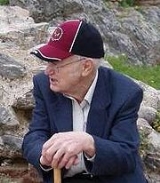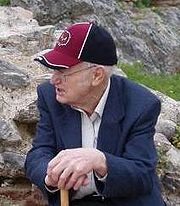
Hans Henning Ørberg
Encyclopedia

Denmark
Denmark is a Scandinavian country in Northern Europe. The countries of Denmark and Greenland, as well as the Faroe Islands, constitute the Kingdom of Denmark . It is the southernmost of the Nordic countries, southwest of Sweden and south of Norway, and bordered to the south by Germany. Denmark...
and received a master's degree
Master's degree
A master's is an academic degree granted to individuals who have undergone study demonstrating a mastery or high-order overview of a specific field of study or area of professional practice...
in English, French and Latin
Latin
Latin is an Italic language originally spoken in Latium and Ancient Rome. It, along with most European languages, is a descendant of the ancient Proto-Indo-European language. Although it is considered a dead language, a number of scholars and members of the Christian clergy speak it fluently, and...
at the University of Copenhagen
University of Copenhagen
The University of Copenhagen is the oldest and largest university and research institution in Denmark. Founded in 1479, it has more than 37,000 students, the majority of whom are female , and more than 7,000 employees. The university has several campuses located in and around Copenhagen, with the...
. He dedicated a great part of his life (1946 to 1952 and 1961 to 1989) to the teaching of these languages in schools in Denmark; 1963-1989 at Grenaa Gymnasium.
Career
From 1953 to 1961 he worked in the Naturmetodens Sproginstitut, an institute where the languages are taught according to the "natural method" of learning. While there he created a new course in Latin: Lingua Latina secundum naturae rationem explicata published in 1955. In 1990 he modernized the system and changed the title to Lingua Latina per se illustrata, which was published with small adjustments. In his retirementRetirement
Retirement is the point where a person stops employment completely. A person may also semi-retire by reducing work hours.Many people choose to retire when they are eligible for private or public pension benefits, although some are forced to retire when physical conditions don't allow the person to...
, he directed the Domus Latina publishing house and gave lectures in Europe
Europe
Europe is, by convention, one of the world's seven continents. Comprising the westernmost peninsula of Eurasia, Europe is generally 'divided' from Asia to its east by the watershed divides of the Ural and Caucasus Mountains, the Ural River, the Caspian and Black Seas, and the waterways connecting...
and the United States
United States
The United States of America is a federal constitutional republic comprising fifty states and a federal district...
on the natural method.
Lingua Latina per se illustrata
Ørberg's Lingua Latina Per Se Illustrata is based on the method of contextual induction. This approach is neither the so-called "natural" nor the "grammar translation" method. In this method the student, who requires no previous knowledge of Latin, begins with simple sentences, such as "Rōma in Italiā est" (RomeRome
Rome is the capital of Italy and the country's largest and most populated city and comune, with over 2.7 million residents in . The city is located in the central-western portion of the Italian Peninsula, on the Tiber River within the Lazio region of Italy.Rome's history spans two and a half...
is in Italy
Italy
Italy , officially the Italian Republic languages]] under the European Charter for Regional or Minority Languages. In each of these, Italy's official name is as follows:;;;;;;;;), is a unitary parliamentary republic in South-Central Europe. To the north it borders France, Switzerland, Austria and...
). Words are always introduced in a context
Context (language use)
Context is a notion used in the language sciences in two different ways, namely as* verbal context* social context- Verbal context :...
which reveals the meaning behind them. Grammar is gradually made more complex, until the student is reading unadapted Latin texts. Unusually for a Latin course, pronunciation and understanding, rather than translation, are stressed. A dictionary is not necessary in this system. Because the textbooks are composed entirely in Latin, they can be used by speakers of any language. The course consists of two parts: Familia Romana and Roma Aeterna along with a series of classic texts like Caesar
Julius Caesar
Gaius Julius Caesar was a Roman general and statesman and a distinguished writer of Latin prose. He played a critical role in the gradual transformation of the Roman Republic into the Roman Empire....
's Commentaries on the Gallic Wars. By means of illustrations and modifications, these texts can be understood through context and by reference to words already learned.
Chapters consist of an illustrated and annotated reading, followed by a concise and formal discussion of the grammar used in the chapter as well as several Pensa, or exercises, that require the student to apply these grammatical concepts to selections from the chapter's reading. These exercises ask the student to manipulate the grammar of Latin sentences rather than to translate. Importantly, even the grammar discussions are entirely in Latin, grammatical terminology being introduced as necessary.

